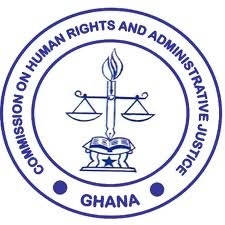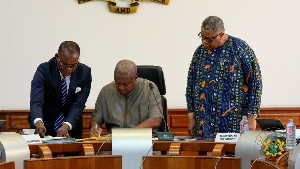The Commission on Human Rights and Administrative Justice (CHRAJ) is to hold public officers accountable to the tenets of the Code of Conduct for public office holders.
As part of measures to up-skill the renewed vigour to fight corruption, the commission through the National Anti-Corruption Action Plan (NACAP) platform would strictly ensure that public officers carry out their responsibilities effectively in transparent and accountable manner.
Mr Richard A. Quayson, acting CHRAJ Commissioner in an interview with the Ghana News Agency, on the sidelines of the NACAP Monitoring and Evaluation workshop in Accra, said the code increases the probability of public officers behaving in certain acceptable ways.
He explained public office as a position of trust; which may be elective or appointive, political office holding or mainline civil or public service position.
“A person holding public office is under a duty to act in the public interest – as the 1992 Constitution provides that a public officer shall not put himself in a position where his personal interest conflicts, or is likely to conflict, with the performance of the functions of his office,” he said.
He said the Code also enjoins that no person shall be appointed or act as the Chairman of the governing body of a public corporation or authority, while he or she holds a position in the service of that corporation or authority.
Mr Quayson noted that the Code sought to among others, to promote a high standard of ethics in public service; to ensure that public officials were accountable to the people and discharge their duties with responsibility, integrity, competence, and loyalty.
“It also seeks to foster patriotism and justice; assist public officials to lead modest lives, and uphold public interest over personal interest; promote good governance, transparency and accountability in Public Offices and improve the image of the public service in Ghana.”
The acting CHRAJ Commissioner noted that public officers in the performance of their official duties, shall act with professionalism and integrity.
“Public Officers shall serve the State with honesty, fairness, integrity, neutrality and impartiality; and ensure that their personal interests or activities do not interfere with or appear to interfere with their obligations to serve the State.
“Public Officers shall perform their official duties with honesty and efficiency, adhering to appropriate standards and at all times, have the public interest in mind,” he said.
Mr Quayson explained that public officers are also to protect non-public, confidential and/or classified information at all times and shall not disclose non-public, confidential and/or classified information without written authority.
He said it was an affront to the Code for a public officer to seek or obtain personal or private benefit from the use of information acquired in the course of official duty.
He reminded public officials that they were under obligation to serve the public in an unbiased and impartial manner and not in any way bring the Public Service into disrepute through their official or private activities.
The acting CHRAJ Commissioner also noted that public officers were under obligation not to put themselves in positions where their personal interests conflicted or were likely to conflict with the performance of the functions of their office.
“Public officers shall not use public office directly or indirectly for private gain; not solicit gifts or favours directly or indirectly from any person; not accept gifts or favours directly or indirectly from any person, when such gifts or favours may compromise the objective performance of official duties.
“Not use or permit the use of State property for activities not associated with the performance of official duties; and shall not, on termination of employment, take improper advantage of the public officers’ previous office,” he noted.
Mr Quayson noted that public officers are again enjoined to maintain political neutrality in the performance of their functions; and shall not, in the performance of official duties, act as agents for or further the interest of political parties.
The acting CHRAJ Commissioner noted that public officers shall not engage in political activity that may compromise or be seen to compromise the political neutrality of public office.
The Validation workshop was organised by the CHRAJ in collaboration with UNDP and attended by NACAP Implementation Support Unit (NISU); NACAP Monitoring and Evaluation Committee (MONICOM); NACAP High Level Implementation Committee (HILIC); and NACAP Ethics and Integrity group.
General News of Friday, 13 November 2015
Source: GNA
CHRAJ holds public officers to code of conduct
 CHRAJ - logo
CHRAJ - logo












